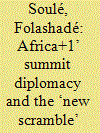|
|
|
Sort Order |
|
|
|
Items / Page
|
|
|
|
|
|
|
| Srl | Item |
| 1 |
ID:
176091


|
|
|
|
|
| Summary/Abstract |
‘RUSSIA–AFRICA SUMMIT 2019’, ‘UK–AFRICA SUMMIT 2020’, ‘Middle East–Africa summit 2020’, ‘Africa–France summit 2020’, ‘Turkey–Africa summit 2020’, ‘Forum on China–Africa Cooperation (FOCAC) 2021’, ‘Russia–Africa summit and Economic forum 2022’. Not a month passes without the announcement of an upcoming ‘Africa+1’ summit, meeting, forum, or other form of summitry1 bringing together the continent’s presidents, ministers, and high-level officials with their traditional, emerging, and aspiring partners or with multilateral organizations.2 Regional bodies like the European Union (EU) have increased the priority given to their Africa strategy as manifested by the European Commission President Ursula von der Leyen’s visit to the African Union (AU) headquarters in February 2020 accompanied by an unprecedented large delegation from Brussels, including 20 commissioners. Non-traditional partners like Malta3 and Estonia4 have also established Africa strategies in 2020. Whether these meetings are focused on promoting trade and investment relations, discussing security matters, or creating platforms to promote a new relationship, they demonstrate that the continent is the subject of rising interest.
|
|
|
|
|
|
|
|
|
|
|
|
|
|
|
|
| 2 |
ID:
176086


|
|
|
|
|
| Summary/Abstract |
In spite of impressive efforts from public and private organizations over the last 25 years, agricultural biotechnology has gained relatively little ground in Africa. Using ethnographic research and case studies from across the continent, we argue that a complex choreography of socio-political, regulatory, and business conditions is required for agricultural biotechnology projects to ‘succeed’ in Africa. While this choreography is rarely achieved, efforts to bring agricultural biotechnology to the continent have resulted in significant reconfigurations of political, legal, and media landscapes in many African countries. These shifts cry out for more scholarly attention, which we attempt to give here.
|
|
|
|
|
|
|
|
|
|
|
|
|
|
|
|
| 3 |
ID:
176090


|
|
|
|
|
| Summary/Abstract |
In Zambia, some people describe their political participation as a way to transmit ideas and hold politicians accountable, while others explain their participation as a bid for resources or personal assistance. These differences follow a geographic trend, with residents of remote areas more likely to focus on substantive material gain. What accounts for this geographic variation? I argue that the centre/periphery distinction within the country influences the way people understand democracy. People living centrally are more likely to hold a procedural understanding of democracy and value democratic rules and process, while people living peripherally are more likely to hold a substantive understanding of democracy and view periodic acts like voting as a bid for resources. I employ geocoded Afrobarometer data alongside 92 original semi-structured interviews to demonstrate that those living further from Zambia’s central rail line are less likely to hold procedural understandings of democracy. I explore several mechanisms that could drive this difference, including homogeneity of remote communities and increased reliance on traditional leaders in peripheral areas. Divergent understandings of democracy between more and less remote denizens have important implications for the future of democratic regimes.
|
|
|
|
|
|
|
|
|
|
|
|
|
|
|
|
| 4 |
ID:
176089


|
|
|
|
|
| Summary/Abstract |
Political parties use different methods—such as holding rallies, door-to-door canvassing, and distributing gifts—to mobilize voters during election campaigns across Africa. But how do parties choose which approach to use in each constituency? We propose that parties prefer to hold rallies in core constituencies, and to use targeted strategies—canvassing and handouts—in swing and opposition districts. However, opposition parties may not have sufficient resources to pursue such a strategy. Ruling parties have the dual advantage of being in a strong financial position, and having the ability to target core voters with state benefits between elections. Using post-election survey data from Ghana’s 2012 election, we show that the ruling party canvassed the most in districts where they were electorally weak and concentrated rallies in their home constituencies. In contrast, the opposition party focused all of its efforts in its home districts. The results highlight how incumbency status shapes parties’ campaign behaviour. They also suggest that ruling parties can combine core and swing voter targeting in different stages of the electoral cycle.
|
|
|
|
|
|
|
|
|
|
|
|
|
|
|
|
| 5 |
ID:
176087


|
|
|
|
|
| Summary/Abstract |
The past two decades that coincide with the return of civil rule in most African countries have witnessed the reinforcement of ethnic nationalism and separatist agitations. While scholarly attention has focused on ethnicity to explain the revival of ethnic nationalism, how ethnic and class discourses conflate in the pursuit of ethnic nationalism remains understudied. Using a qualitative-dominant approach, this article interrogates how the Igbo petty bourgeoisie use ethnicity to mask the underlying differences in their material conditions in relation to the alienated masses. It also examines how these differences shape post-war Igbo nationalism. In the main, this article argues that the intersection of ethnic and class discourses is underpinned by unequal distribution of rights and powers accruing from productive resources. This unequal distribution of rights and powers results in differential material well-being and gives rise to conflicts between the dominant and subordinate classes. This explains the divergent approaches of the different factions of Igbo petty bourgeoisie to Igbo nationalism in Nigeria. The article concludes that understanding the political economy of the intersection of ethnic and class discourses is relevant for resolving the nationality question and the Biafra secessionist agitations in Nigeria and others across Africa.
|
|
|
|
|
|
|
|
|
|
|
|
|
|
|
|
| 6 |
ID:
176088


|
|
|
|
|
| Summary/Abstract |
The expansive literature on law and justice across Africa emphasizes why people do not use lower state courts. Consequently, a striking lack of attention is paid to how and why people do engage with lower state courts. Drawing on a systematic literature review and a multi-sited qualitative study, we make three contributions on this topic. First, we explore how this academic gap emerged. Second, we critique the procedural justice model that currently underlies much ‘access to justice’ programming, which seeks to improve citizens’ engagements with the courts. In place of what we describe as its arithmetic assumptions about institutional engagement, value, and legitimacy, we propose a trifactor framework. Citizen engagement, we argue, occurs as people reconcile how they think the courts should act, how they expect them to act, and how they need them to act in any given instance. Third, drawing on our empirical studies, we highlight that this framework is flexible enough to capture people’s actually existing decision-making in a wide variety of settings and to map how those trade-offs shift throughout the process of their case, providing important insights into ideas of justice and statehood.
|
|
|
|
|
|
|
|
|
|
|
|
|
|
|
|
|
|
|
|
|